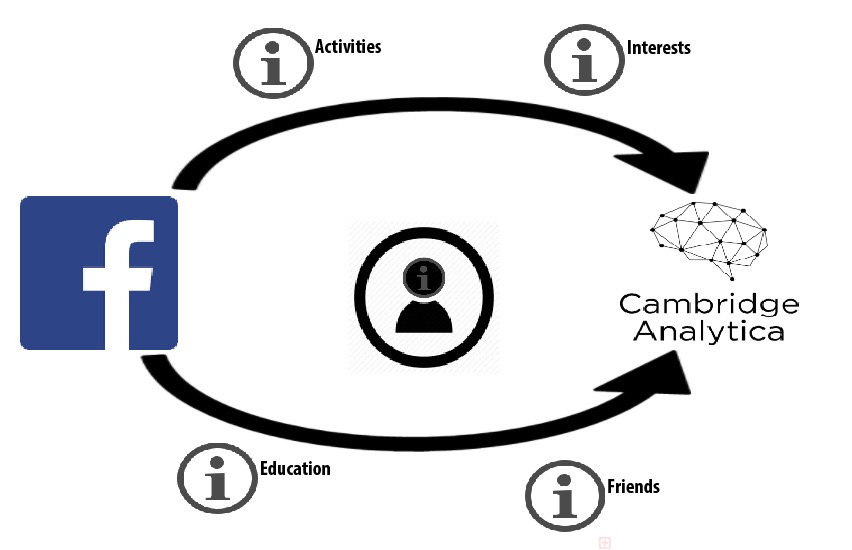Cambridge Analytica data breach of Facebook sparks outrage
Facebook granted access to users’ private information to Cambridge Analytica, a firm that worked for the Trump campaign. The company hired Aleksandr Kogan to gather data of more than 87 million American Facebook users.
May 7, 2018
The U.K. affiliate of Cambridge Analytica, a political firm founded by large Republican donor Robert Mercer and former White House chief strategist Steve Bannon, used surveys conducted through an app and Facebook to profile an estimated 87 million users to better target President Trump’s message and influence the American presidential election.
The company hired Aleksandr Kogan to gather data of American Facebook users. Kogan paid most of around 300,000 Facebook users to download his app, This Is Your Digital Life. In the app, users answered a series of surveys, and Kogan gathered data of those users and their Facebook friends, increasing the number of people affected by this from 300,000 to 87 million.
Facebook has allowed developers to offer their own applications within their space, and at the time, if their privacy settings allowed it, Facebook permitted data collection on friends of the users of the aforementioned applications.
Public speculation and outrage about this situation began when it was brought to light by whistleblower Christopher Wylie, who helped found and used to work for Cambridge Analytica until late 2014. Wylie described how the company used the data gathered to influence foreign elections and expressed that the leaders of the company had no qualms about what they were doing.
“They don’t care whether or not what they do is legal, as long as it gets the job done,” he said as part of his testimony to the House of Commons Digital, Culture and Sport Committee. “Broadly, this is a company that goes around the world and undermines civil institutions of countries that are struggling to develop those institutions. They are an example of what modern-day colonialism looks like.”
Wylie began to realize the extent of Cambridge Analytica’s power when Donald Trump was elected and reached out to the Guardian soon after President Trump’s inauguration. He has also since alleged that the company was involved in the swaying of the Brexit referendum in 2016. However, many believe that the company’s data collection was not very successful and didn’t affect the election very much at all.
“There is little or no evidence for Cambridge Analytica’s record of success: what we do know is that they were behind Ted Cruz, who lost to Trump, despite Cambridge Analytica’s supposed expertise. We also know they joined Trump’s campaign very late in the game. All that said, there is no evidence that Cambridge Analytica was actually effective at changing individuals’ voting choices,” Dr. Chico Camargo, a postdoctoral researcher in data science at Oxford University, said. “From the videos released by the BBC Channel 4, it seems that Cambridge Analytica has more experience with ‘old-school’ tricks, and there is still no evidence that their data-based approaches were at all effective.”
Camargo refers to the undercover video released of Cambridge Analytica’s CEO, Alexander Nix, suggesting that the company used bribery and seduction to influence foreign elections and entrap politicians. Soon after the news broke, Cambridge Analytica suspended him.
In addition to the outrage surrounding Cambridge Analytica, Mark Zuckerberg and Facebook have come under fire from critics who say that the CEO did not do enough to prevent this breach. Facebook has since said that Kogan had violated the company’s policies by giving the data to Cambridge Analytica and that they had taken action at the end of 2015, when they first heard of Kogan.
The company has also notified all users affected and is doing a full investigation and audit of the extent of Aleksandr Kogan’s work in addition to an investigation into thousands of apps.
Since then, Zuckerberg has testified in front of both parts of Congress on April 10 and 11 regarding the data breach in addition to various other problems surrounding Facebook, such as the Russian meddling in the presidential election, silencing of conservative voices and possibly being a monopoly. Most lawmakers and experts are sure that regulations were necessary though it was unclear the specificities of such regulations.
“[Computer science] is not very regulated in comparison with other fields which had big developments that can lead to disaster; chemistry with dynamite, physics with the nuclear bomb, architecture and civil engineering with the collapse of bridges and buildings,” Camargo said. “Computer science and data science need regulation as well as codes of ethics, safety standards and licensing boards with the legal ability to ban someone from the profession, quite a lot like in medicine or engineering, to ensure that people handling data are aware of what they shouldn’t do, despite their power. It would not be an easy task to set up these committees and rules, but regulation and certification are important to stop us from building computer systems that might allow for abuse of power.”
Cambridge Analytica’s parent company, the SCL Group, were in contact with Russian oil conglomerate Lukoil as the company built its profiles after gathering data. This connection reveals a possible link between Russia and the 2016 presidential election.
This piece was originally published in the pages of the Winged Post on May 7, 2018.


















![“[Building nerf blasters] became this outlet of creativity for me that hasn't been matched by anything else. The process [of] making a build complete to your desire is such a painstakingly difficult process, but I've had to learn from [the skills needed from] soldering to proper painting. There's so many different options for everything, if you think about it, it exists. The best part is [that] if it doesn't exist, you can build it yourself," Ishaan Parate said.](https://harkeraquila.com/wp-content/uploads/2022/08/DSC_8149-900x604.jpg)




![“When I came into high school, I was ready to be a follower. But DECA was a game changer for me. It helped me overcome my fear of public speaking, and it's played such a major role in who I've become today. To be able to successfully lead a chapter of 150 students, an officer team and be one of the upperclassmen I once really admired is something I'm [really] proud of,” Anvitha Tummala ('21) said.](https://harkeraquila.com/wp-content/uploads/2021/07/Screen-Shot-2021-07-25-at-9.50.05-AM-900x594.png)







![“I think getting up in the morning and having a sense of purpose [is exciting]. I think without a certain amount of drive, life is kind of obsolete and mundane, and I think having that every single day is what makes each day unique and kind of makes life exciting,” Neymika Jain (12) said.](https://harkeraquila.com/wp-content/uploads/2017/06/Screen-Shot-2017-06-03-at-4.54.16-PM.png)








![“My slogan is ‘slow feet, don’t eat, and I’m hungry.’ You need to run fast to get where you are–you aren't going to get those championships if you aren't fast,” Angel Cervantes (12) said. “I want to do well in school on my tests and in track and win championships for my team. I live by that, [and] I can do that anywhere: in the classroom or on the field.”](https://harkeraquila.com/wp-content/uploads/2018/06/DSC5146-900x601.jpg)
![“[Volleyball has] taught me how to fall correctly, and another thing it taught is that you don’t have to be the best at something to be good at it. If you just hit the ball in a smart way, then it still scores points and you’re good at it. You could be a background player and still make a much bigger impact on the team than you would think,” Anya Gert (’20) said.](https://harkeraquila.com/wp-content/uploads/2020/06/AnnaGert_JinTuan_HoHPhotoEdited-600x900.jpeg)

![“I'm not nearly there yet, but [my confidence has] definitely been getting better since I was pretty shy and timid coming into Harker my freshman year. I know that there's a lot of people that are really confident in what they do, and I really admire them. Everyone's so driven and that has really pushed me to kind of try to find my own place in high school and be more confident,” Alyssa Huang (’20) said.](https://harkeraquila.com/wp-content/uploads/2020/06/AlyssaHuang_EmilyChen_HoHPhoto-900x749.jpeg)












